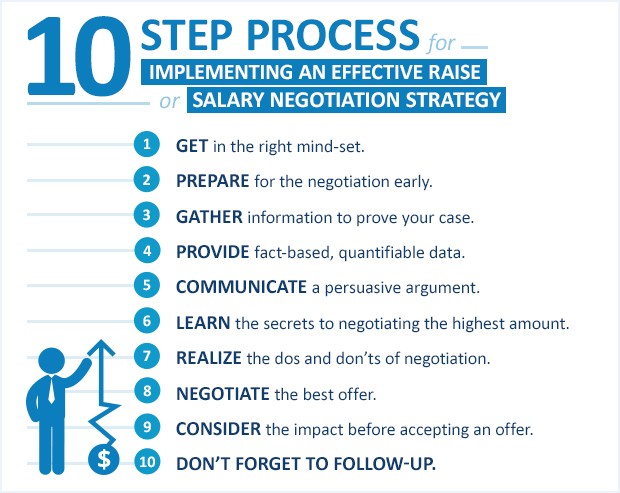Salary Negotiation Tips: Mastering the Art of Earning What You Deserve

Negotiating your salary is one of the most important skills you can develop in your career. Salary negotiations can significantly impact your financial future, job satisfaction, and overall career trajectory. Whether you’re negotiating a new job offer or asking for a raise, knowing how to navigate the conversation effectively is crucial.
In this article, we’ll provide you with actionable salary negotiation tips that will help you confidently secure the compensation you deserve. From preparation to closing the deal, we’ll cover everything you need to know to negotiate with skill and professionalism.
Why Salary Negotiation Matters
Before we dive into the specific strategies, it’s essential to understand why salary negotiations matter so much. Your compensation is not just about money—it’s a reflection of your value in the marketplace. Negotiating effectively helps you:
- Increase your earning potential: By asking for what you’re worth, you ensure that you’re not undervalued.
- Improve job satisfaction: Fair compensation boosts your morale and motivation, making you more committed to your role.
- Set the tone for future opportunities: A strong negotiation sets a positive precedent for future salary reviews and career growth.
The Power of Negotiation
The ability to negotiate salary is a key factor that can influence your entire career. A survey by PayScale reveals that employees who negotiate their salaries tend to earn higher salaries over time. This ability to negotiate increases not only your income but also your overall professional value.

1. Do Your Research: Know Your Worth
Before you start negotiating, it’s essential to understand the market value of your role. Use online tools like Glassdoor, PayScale, and LinkedIn Salary to research salary ranges for your position in your industry, location, and with your level of experience. Make sure to:
- Compare salary ranges: Look for similar positions in companies of comparable size and industry.
- Factor in benefits: Don’t forget to consider benefits like healthcare, retirement plans, bonuses, stock options, and paid time off, as they contribute to your overall compensation.
How to Research Effectively:
- Use salary comparison websites: Websites like Glassdoor and PayScale provide detailed salary data, including ranges based on experience, company, and location.
- Network with industry peers: If you can, reach out to colleagues or mentors to gain insight into what others in your industry are making.
- Consider your experience and skills: Tailor the research to reflect your experience level, education, and specific skill set.
By gathering this information, you’ll know what is reasonable to ask for, which will help you negotiate from a position of strength.
2. Understand the Employer’s Perspective
While it’s important to advocate for your needs, it’s equally essential to understand the employer’s perspective. Employers are likely to negotiate based on their budget, the value you bring to the company, and their company’s compensation structure.
- Know the budget constraints: Larger companies often have more flexibility in salary negotiations, while smaller companies may have limited budgets.
- Understand the role’s value: Make sure to highlight how your skills and experience will directly benefit the company.
- Be aware of timing: If the company is in a hiring freeze or going through budget cuts, they may be less flexible on salary.
3. Know When to Start Negotiating
The timing of your salary negotiation is crucial. Here are the key moments when you should negotiate your salary:
- Before accepting a job offer: Once you’ve received an offer, this is the optimal time to negotiate your salary. The employer has already decided they want you, making this a perfect time to secure the best compensation package.
- During performance reviews: If you’ve been at a company for a while, the annual performance review is a natural time to bring up a salary increase.
- When you’ve taken on additional responsibilities: If you’ve taken on new projects or added significant value to the company, you may be entitled to a raise.
“The best time to negotiate your salary is when your value is clear, and the employer is eager to secure you as part of their team.” – Business Insider

4. Practice Your Pitch
Before entering into any salary negotiation, it’s important to practice your pitch. This helps you gain confidence, refine your messaging, and ensure you’re articulating your value clearly.
Tips for Practicing:
- Prepare a script: Write out what you plan to say, focusing on your accomplishments and why you’re asking for a higher salary.
- Role-play with a friend: Practice negotiating with a friend or mentor who can provide constructive feedback.
- Stay calm and confident: Avoid sounding desperate or apologetic. Keep a positive attitude and focus on your worth.
Your goal is to remain professional and assertive, while keeping the conversation focused on your skills, achievements, and how you can contribute to the company’s success.
5. Use Effective Communication Techniques
During the negotiation, communication is key. Here are some strategies to ensure your conversation is productive:
- Be clear about your expectations: Start by stating the salary range you’re targeting. Avoid giving a single figure, as this may limit your negotiating room.
- Highlight your achievements: Focus on your accomplishments and how they directly contribute to the company’s success.
- Listen actively: Pay attention to what the employer says about their budget and needs. Respond thoughtfully, showing that you understand their perspective.
The Power of Silence:
One of the most effective negotiation techniques is the power of silence. After making your request, stay quiet and wait for the employer to respond. This tactic can often lead the employer to make a counteroffer or offer more than they initially intended.
6. Consider the Entire Compensation Package
While salary is the most obvious factor in your compensation, don’t overlook the entire compensation package. If the employer is unwilling to meet your salary expectations, you can negotiate other perks and benefits, such as:
- Signing bonuses
- Stock options or equity
- Flexible working hours
- Additional vacation time
- Professional development opportunities
By considering the whole package, you can increase your overall satisfaction without solely focusing on base salary.
7. Be Prepared for Objections
Sometimes, employers may resist your salary request due to budget constraints or other reasons. In these cases, it’s important to remain flexible and work with the employer to find a solution.
How to Handle Objections:
- Ask for feedback: If they say no, ask for feedback on why they can’t meet your request and see if there’s room for negotiation on other aspects.
- Be patient: It may take time for the employer to get approval for your requested salary or to make adjustments.
- Know when to compromise: If salary isn’t negotiable, try to secure other benefits, such as remote work options or a signing bonus.
FAQs About Salary Negotiation
1. What is the best way to ask for a salary increase?
Start by outlining your achievements and the value you’ve brought to the company. Be clear about your expectations and back up your request with market research and data.
2. How do I handle an employer who says they don’t have the budget for a raise?
If the employer can’t meet your salary expectations, ask for other benefits such as extra vacation days, flexible hours, or professional development opportunities. You may also want to explore the possibility of revisiting salary discussions in the near future.
3. What should I do if I’m offered a job with a lower salary than expected?
Evaluate the entire compensation package, including benefits and work-life balance. If the salary is a dealbreaker, respectfully explain your reasons for declining or negotiate for a better offer.
4. When is the best time to negotiate salary?
The best time to negotiate salary is after you’ve received a job offer or during a performance review. You can also negotiate salary when you’ve taken on new responsibilities or projects.
5. Should I accept the first offer?
It’s typically advisable not to accept the first offer immediately. Employers expect some negotiation, and it’s your opportunity to ensure you’re getting a fair compensation package.
Conclusion: Master the Art of Salary Negotiation
Salary negotiation is an essential skill that can significantly impact your career and financial well-being. By preparing thoroughly, understanding your worth, practicing your pitch, and considering the full compensation package, you’ll be in a strong position to secure the salary you deserve.
Remember that salary negotiation is a two-way conversation. Approach it with confidence, professionalism, and an open mind, and you’ll increase your chances of landing a compensation package that reflects your true value. With these salary negotiation tips, you’ll be equipped to take control of your career’s financial future.

